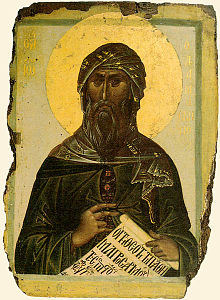List of Byzantine composers
The Byzantine Empire lasted from AD 395 to 1453, during which various musical styles arose; even after the Fall of Constantinople in 1453 the Byzantine musical tradition continued in the Ecumenical Patriarchate of Constantinople through figures such as Panagiotes the New Chrysaphes, Petros Bereketis, Petros Peloponnesios, and Chrysanthos of Madytos[1][2] as well as Serbians such as Kir Stefan, Isaiah, Nikola and Kir Joakim.[3] Both sacred and secular music were commonplace, with sacred music frequently used in church services and secular in various events including, ceronmonies, dramas, ballets, banquets, festivals and sports games.[1][2] However, despite its popularity, secular music was continuously criticized by Church Fathers, particularly Jerome.[2][n 1]
Composers of sacred music, especially hymns and chants, are well documented throughout the history of Byzantine music. The first major form was Kontakion, of which Romanos the Melodist was the foremost composer. In the late 7th century the kanōn overtook the Kontakion in popularity; Andrew of Crete became its first significant composer. The Kañon reached its peak with the music of John of Damascus and Cosmas of Maiuma and later Theodore of Stoudios and Theophanes the Branded in the 8th and 9th centuries respectively.[1] Throughout the 9th-century, Kassia was a prolific composer of sticheron hymns.[4] John of Damascus may have also been responsible for the development of the Octoechos.[5]
Composers of secular music are noticeably less documented. Not until late in the empire's history are composers known by name, with Joannes Koukouzeles, and as the leading figures.[2]
Byzantine composers[]
| Name | Lifetime | Birthplace | Works | Image | Ref(s) |
|---|---|---|---|---|---|
| Fall of the Western Roman Empire in 476 | |||||
| Romanos the Melodist | late 5th century – after 550 | Jewish-Syrian-born Byzantine | Hymnographer |
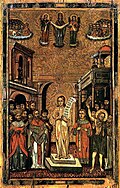 |
[6] |
| Kyriakos | 6th century | ? | Composer | – | [7] |
| Anastasius[n 2] | 6th century | ? | Composer and emperor | – | [7] |
| Andrew of Crete | c. 660 – c. 740 | Syrian-Born | Hymnographer |
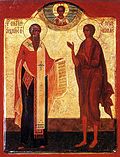 |
[8] |
| John of Damascus | c. 675 – c. 749 | Syrian-Born | Hymnographer Various Kanōns |
 |
[9] |
| Cosmas of Maiuma | fl. early 8th century | Syrian | Hymnographer Various Stichēra idiomelas, triōdias and kanōns |
 |
[10] |
| Stephen the Sabaite | c. 725 – 796/807 | Julis, nephew of St. John of Damascus | Hymnographer Idiomelas in the Triodion, Kanōns |
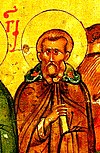 |
[11] |
| Theodore the Studite | 759 – 826 | Constantinople | Hymnographer various hymns |
 |
[12] |
| Theophanes the Branded | 775 – 845 | Jund Filastin | Hymnographer Contributions in the Parakletike Kanōns for saints and his brother, Theodorus |
 |
[13] |
| Kassia | 805/810 – 865/867 | Constantinople | Hymnographer and composer More than 50 liturgical works; 26 have disputed authenticity |
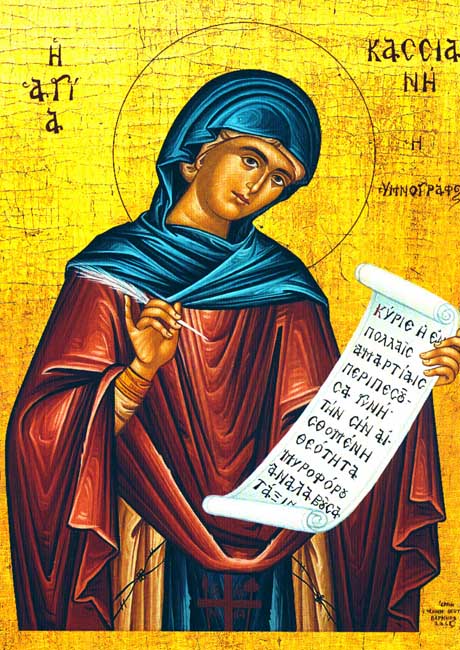 |
[14] |
| Joseph the Hymnographer | c. 816 – 886 | Sicilian-Greek | Contributions to the Parakletike,[15] various Kanōns of which 525 survive. |
 |
[16] |
| Joseph the Confessor | fl. 9th century | ? | Hymnographer Triodia, stikhera and kanōns |
– | [17] |
| Leo VI the Wise | 866 – 912 | Constantinople | Hymnographer Hymns for the Great Feast of the Exaltation of the Cross |
 |
[18] |
| Constantine VII | 905 – 959 | Constantinople | Emperor and Poet-composer |
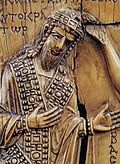 |
[19] |
| fl. c. 1300 | ? | Composer of liturgical chant |
– | [20] | |
| fl. c. 1300 | ? | Composer of Byzantine chant stichēron |
– | [21] | |
| John Koukouzelis | fl. 1300–50 | Durrës | Composer and singer |
 |
[22] |
| fl. 1325–50 | ? | Monk and composer of liturgical chant |
– | [23] | |
| fl. Late 13th century | ? | Composer of Byzantine chant |
– | [24] | |
| John Kladas | fl. 1400 | ? | Hymnographer |
– | [25] |
| fl. first half of the 15 century | ? | Composer May be author of a Discourse on the Signs of Chant |
– | [26] | |
| Manuel Chrysaphes | fl. 1440–1463 | ? | Composer and theorist Hymns and chants |
– | [27] |
| Janus Plousiadenos | c. 1429–1500 | Crete | – | ||
| Fall of Constantinople results in the conquest of the Byzantine Empire by the Ottoman Empire in 1453 | |||||
Notes[]
- ^ Touliatos 2001a lists John Chrysostom, Tertullian, Cyprian, Clement of Alexandria, Gregory Nazianzen, Basil the Great, Ambrose, Augustine of Hippo and Jerome as the church fathers who were vocally against secular Byzantine music
- ^ A composer recorded as "Anastasius" is thought to be a 6th century Byzantine emperor, either Anastasius I Dicorus (c. 431 – 9 July 518) or Anastasios II (Died 719)
References[]
Notes[]
- ^ Jump up to: a b c Levy 2001.
- ^ Jump up to: a b c d Touliatos 2001a.
- ^ Randel, Don Michael, ed. (2003). The Harvard Dictionary of Music. Cambridge, Massachusetts: Harvard University Press. pp. 751, 771. ISBN 978-0-674-01163-2.
- ^ Mellas 2020, pp. 147–148.
- ^ Jeffery, Peter (2001). "Oktōēchos". Grove Music Online. Oxford, England: Oxford University Press. doi:10.1093/gmo/9781561592630.article.50097. (subscription or UK public library membership required)
- ^ Engberg, Gudrun (2001). "Romanos the Melodist". Grove Music Online. Revised by Alexander Lingas. Oxford: Oxford University Press. doi:10.1093/gmo/9781561592630.article.23748. (subscription or UK public library membership required)
- ^ Jump up to: a b Kucharek, Casimir A. (1971). The Byzantine-Slav Liturgy of St. John Chrysostom: Its Origin and Evolution. Combermere, Ontario: Alleluia Press. p. 394. ISBN 978-0-911726-06-0.
- ^ (2001). "Andrew of Crete". Grove Music Online. Oxford: Oxford University Press. doi:10.1093/gmo/9781561592630.article.00894.CS1 maint: multiple names: authors list (link) (subscription or UK public library membership required)
- ^ (2001). "John Damascene". Grove Music Online. Oxford: Oxford University Press. doi:10.1093/gmo/9781561592630.article.14388.CS1 maint: multiple names: authors list (link) (subscription or UK public library membership required)
- ^ (2001). "Kosmas of Jerusalem". Grove Music Online. Oxford: Oxford University Press. doi:10.1093/gmo/9781561592630.article.15408.CS1 maint: multiple names: authors list (link) (subscription or UK public library membership required)
- ^ Patrich 2001, p. 11.
- ^ Thomas, John philip; Hero, Angela Constantinides, eds. (2000). Byzantine Monastic Foundation Documents: A Complete Translation of the Surviving Founders' Typika and Testaments. Washington, D.C.: Dumbarton Oaks Research Library and Collection. pp. 85. ISBN 978-0-88402-232-9.
- ^ Patrich 2001, p. 174.
- ^ Touliatos, Diane (2001b). "Kassia". Grove Music Online. Oxford: Oxford University Press. doi:10.1093/gmo/9781561592630.article.40895. (subscription or UK public library membership required)
- ^ Jeffery, Peter (2001). "Oktōēchos". Grove Music Online. Oxford: Oxford University Press. doi:10.1093/gmo/9781561592630.article.50097. (subscription or UK public library membership required)
- ^ Toma, Paraskevi, ed. (2018). The Sabaite Heritage in the Orthodox Church from the Fifth Century to the Present. Münster, Germany: LIT Verlag. pp. xxi–xxii. ISBN 978-3-643-90995-4.
- ^ "Saint Joseph, Bishop of Thessalonica, and brother of Saint Theodore of Studion". Orthodox Church in America.
- ^ Cartwright, Mark (2017). "Leo VI". World History Encyclopedia. Horsham, United Kingdom.
- ^ Troelsgård, Christian (2001). "Constantine VII Porphyrogennetus". Grove Music Online. Oxford: Oxford University Press. doi:10.1093/gmo/9781561592630.article.06331. (subscription or UK public library membership required)
- ^ Williams, Edward V. (2001). "Ethikos, Nikephoros". Grove Music Online. Revised by Christian Troelsgård. Oxford: Oxford University Press. doi:10.1093/gmo/9781561592630.article.09050. (subscription or UK public library membership required)
- ^ "Glykys, Gregorios". Grove Music Online. Oxford: Oxford University Press. 2001. doi:10.1093/gmo/9781561592630.article.11305. (subscription or UK public library membership required)
- ^ Williams, Edward V. (2001). "Koukouzeles [Papadopoulos], Joannes". Grove Music Online. Revised by Christian Troelsgård. Oxford: Oxford University Press. doi:10.1093/gmo/9781561592630.article.15428. (subscription or UK public library membership required)
- ^ Troelsgård, Christian (2001). "Korones, Xenos". Grove Music Online. Oxford: Oxford University Press. doi:10.1093/gmo/9781561592630.article.51928. (subscription or UK public library membership required)
- ^ Williams, Edward V. (2001). "Glykys, Joannes". Grove Music Online. Revised by Christian Troelsgård. Oxford: Oxford University Press. doi:10.1093/gmo/9781561592630.article.11306. (subscription or UK public library membership required)
- ^ Williams, Edward V. (2001). "Kladas [Lampadarios], Joannes". Grove Music Online. Revised by Christian Troelsgård. Oxford: Oxford University Press. doi:10.1093/gmo/9781561592630.article.15917. (subscription or UK public library membership required)
- ^ "Gabriel Hieromonachos". Oxford Reference. Oxford: Oxford University Press. (subscription or UK public library membership required)
- ^ Conomos, Dimitri E. (2001). "Chrysaphes, Manuel". Grove Music Online. Oxford: Oxford University Press. doi:10.1093/gmo/9781561592630.article.05722. (subscription or UK public library membership required)
Sources[]
- Levy, Kenneth (2001). "Byzantine Chant". Grove Music Online. Revised by=Christian Troelsgård. Oxford: Oxford University Press. doi:10.1093/gmo/9781561592630.article.04494.
- Mellas, Andrew (2020). Liturgy and the Emotions in Byzantium: Compunction and Hymnody. Cambridge: Cambridge University Press. doi:10.1017/9781108767361. ISBN 978-1-108-76736-1.
- Patrich, Joseph, ed. (2001). The Sabaite Heritage in the Orthodox Church from the Fifth Century to the Present. Leuven: Peeters. ISBN 978-90-429-0976-2.
- Touliatos-Banker, Diane (Spring 1984). "Women Composers of Medieval Byzantine Chant". College Music Symposium. 24 (1): 62–80. JSTOR 40374217.
- Touliatos, Diane (2001a). "Byzantine secular music". Grove Music Online. Oxford: Oxford University Press. doi:10.1093/gmo/9781561592630.article.48192. (subscription or UK public library membership required)
External links[]
- Byzantine music
- Lists of composers by nationality
- Byzantine Empire-related lists
